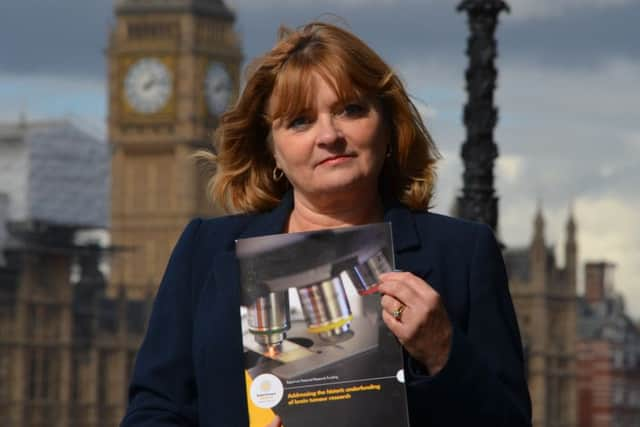Milton Keynes woman welcomes spotlight on brain tumour research


A pioneering national charity based in Shenley Wood has produced a new report tackling under-funding of the disease which kills more children and adults under the age of 40 than any other cancer.
The charity Brain Tumour Research has published a national report which is aimed at tackling the historical under-funding of research into brain tumours and the devastating consequences of limited treatment.
Advertisement
Advertisement
Brain tumour patient and mother of a six-year-old daughter, Helen Legh, welcomed the report.


Helen, who lives in Bletchley and is known to many as a presenter on BBC Three Counties Radio, was diagnosed with an aggressive brain tumour at the end of 2014 and given 14 months to live.
She underwent a seven-hour operation to remove the tumour, followed by radiation and chemotherapy and Helen has also been taking part in a clinical trial.
She said: “It doesn’t make sense to think that brain tumours kill more children and adults under the age of 40 than any other cancer - yet just 1 per cent of the national spend on cancer research is allocated to this devastating disease.
Advertisement
Advertisement
“Brain tumour patients and their families are being let down, so little is known about this dreadful disease and treatment options remain limited.


“No real improvement has been made for years and this must change. Brain tumours are indiscriminate, they can affect anyone at any age and incidences of, and deaths from, brain tumours are increasing.”
Sue Farrington Smith, chief executive of Brian Tumour Research, said: “For too long, brain tumours have been a neglected cancer with successive governments failing patients and their families for decades.
“Tragic stories like Helen’s remind us all that we cannot allow this desperate situation to continue.
Advertisement
Advertisement
“Along with our member charities, we are campaigning for fairness in cancer research funding, so that brain tumour patients can see the same improvements in treatments and outcomes that breast cancer and leukaemia patients have. Together we will find a cure.”
The report reveals that less than 10 per cent of people in the UK know that brain tumours kill more children and adults under the age of 40 than any other cancer.
A study of over 2,000 adults was conducted by Populus on behalf of Brain Tumour Research with respondents citing leukaemia as the biggest cancer killer of children and breast, lung and bowel as the biggest cancer killers of adults.
The report highlights the need for substantial funding increases from three main drivers of brain tumour research spend, government partners of the National Cancer Research Institute (NCRI), Cancer Research UK and other charity partners of the NCRI, and brain tumour research charities supported by the general public and organisations.
Advertisement
Advertisement
Brain Tumour Research is campaigning to see the national spend on brain tumour research increased to £30 million - £35 million a year, in line with breast and leukaemia, in order to advance treatments and ultimately find a cure.
The report describes the stark inequalities in cancer research funding in this country, which correlate tragically to poor survival rates for brain tumour patients.
Less than 20 per cent of brain tumour patients survive beyond five years of their diagnosis, whereas 86 per cent of breast cancer and 51 per cent of leukaemia patients survive beyond five years.
In 2005, five-year survival for brain tumour patients was just 14 per cent, so it is encouraging to see an improving trend, partly due to scientific advances particularly for medulloblastoma in children.
Advertisement
Advertisement
However, survival is still far behind breast cancer and leukaemia, diseases that lead on levels of national research spend.
Every week, a family loses their child to a brain tumour, more than those lost, under the age of 15, to leukaemia.
In 2015, the number of children dying of cancer was 194, with brain tumours taking 67 of these and leukaemia 46.
The report reveals that the incidence of brain tumours is rising.
Latest figures show that the total number of cases in England has grown 19% since 2002, from 3,546 to 4,201 cases in 2014.
For more information, visit: www.braintumourresearch.org